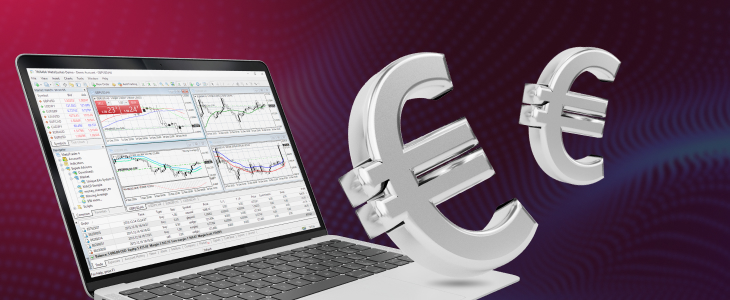In recent years, the international economic landscape has witnessed a rapid movement towards BRICS+ de-dollarization. It is primarily a strategic move by emerging economies to reduce their reliance on the US dollar. Also, at the center, we will find the BRICS bloc, which has currently expanded into BRICS+ with the inclusion of various regions.
For instance, the countries are mainly Ethiopia, Egypt, Argentina, Saudi Arabia, and the UAE. The following nations have actively sought to challenge the dominance of the dollar value in international trade and commerce. Moreover, we will find a central question surrounding the immunity of the Euro to BRICS+ and several factors.
In this article, we will discuss whether the Euro’s value is immune to BRICS+ de-dollarization announcements and what impact it may have on trading platforms and traders.
The Strategy of The BRICS+ De-Dollarization
De-dollarization is an effort by multiple regions to decrease their reliance on the US dollar in various commercial situations. For instance, they are mainly trade settlements in the forex market, reserves, and commercial platforms.
Additionally, for BRICS+, a strategy has emerged as an impactful announcement due to the integration of intergovernmental pressures. Moreover, it is mainly between Russia and China/China on the one hand, and the US, alongside the expanding clout of the rising markets, on the other hand, that we can also notice various alternative implementations by different countries, such as:
- Trade settlements can be made in local currencies or the Chinese Yuan.
- Developing alternatives to SWIFT, like SPFS of Russia and CIPS of China.
- Discussing the development of a basic BRICS currency or a digital facility for trade agreements.
- Enhancing gold reserves for hedging against dollar volatility.
The Position of the Euro in The International Monetary System
Since the introduction of the Euro in 1999, it has become the second-largest trading currency and reserve in the world, also in the forex market and CFD trading. It also accounts for roughly 20 percent of international central bank reserves and 30 percent of global transactions. Moreover, the Euro also has a variety of strengths, such as:
- Economic Volume: The eurozone is one of the biggest economic blocs from a global perspective.
- Commercial Infrastructure: Europe mainly encourages deep capital markets and efficient management institutions.
- Stability: Despite frequent crises, such as the sovereign debt, the world mainly views the Euro as a store of stable value.
- Political Autonomy: Since there is no direct relation between the Euro and US foreign policy, the Euro appears more neutral from the perspective of different nations.

The Euro Appeal in BRICS+ De-Dollarization Economy
If BRICS+, alongside various emerging economies, reject the US dollar, they will require efficient alternatives. As the Euro possesses virtues in multiple factors, such as stability, convertibility, and liquidity, it can indeed serve many benefits, but only to a certain extent.
Nonetheless, there are various scenarios where the Euro could earn its benefits from, such as:
- Reserve Diversification: Central banks seeking to diversify away from dollar assets may change a segment of their reserves to euros.
- Trade Agreements: There are several notable instances of the Euro’s presence in primary commodity markets, particularly in energy contracts involving European regions. As the EU attempts to position itself as a more independent factor, it could also increase its value.
- Safe-Haven Alternative: During times of aggressive US monetary policy and dollar volatility, the value of the Euro may seem more appealing to investors and traders.
Challenges of The Euro Emergence
Although the Euro can provide various opportunities, especially during the devaluation of the US dollar, traders may notice certain structural and political limitations. For example, here are some points you can follow:
Segmented Fiscal Policy
The eurozone generally lacks a unified fiscal authority in the trading market. It restricts the ability of Euros to act directly during crises and undermines confidence in long-term stability.
Intergovernmental Focus
The EU is primarily relevant to US intergovernmental policy, particularly within NATO and through various sanctions imposed against Russia. Additionally, some regions seek complete neutrality, which also views the Euro as an inefficient factor, differing from the dollar, while maintaining intergovernmental independence.
Restricted Euro Clearing Formation
Although Europe has a large number of banking systems, the international euro clearing and payment facilities are not as responsive as the US dollar system.
Energy Reliance
Various eurozone regions heavily depend on energy imports, particularly from countries such as Russia and the Middle East. Moreover, this factor can develop various vulnerabilities during crises, which can also impact the perception of the currency.
Lack of International Push
Unlike China, which actively encourages the Yuan through the Belt and Road Initiative and bilateral swap management, the Euro lacks a coordinated globalization strategy.
BRICs+ Focus on Yuan
We must remember that several BRICS+ de-dollarization activities have primarily prioritized the Chinese Yuan, rather than the Euro. Following China’s extensive trade surpluses, alongside its digital payment landscape and international partnerships, the country has enabled the Yuan to position itself as a dominant alternative to the dollar.
Currently, the Chinese Yuan makes up more than 5 percent of the international reserve, and various BRICS+ members have already settled their bilateral trade in the Yuan currency. Moreover, the focus on the Yuan reduces the potential of the Euro as a basic dollar alternative.

In Conclusion
Although the Euro is not entirely immune to the impacts of BRICS+ de-dollarization, it is also not a direct target of its influence. As the international commercial system gradually becomes more cross-polar, the Euro will be more likely to play a supporting role in the global market.
There are various structural markets for Euros, which provide a sufficient amount of value. Moreover, it has also presented itself as a settlement currency for various regions seeking dollar alternatives. Nonetheless, you also have to consider the negative impacts, which suggest why the Euro might not be an ideal option.
The trading landscape offers a variety of platforms for conducting trading operations, but only a few are reliable. However, our FXcess platform operates differently, as it provides you with various facilities. For example, they are affordable brokers and affiliated programmes to ensure your flawless trading operations.
FAQs
1. What significance does BRICS carry in de-dollarization?
– BRICS mainly contributes to de-dollarization by creating dollar alternative systems for global payments.
2. What would happen if BRICS replaced the US dollar?
– The replacement would ultimately decrease the efficiency and strength of the US sanctions.
3. Is BRICS in the process of making a new currency?
– No, the BRICS is not currently developing any new currency against the dollar.
4. Can BRICS threaten the US dollar?
– Currently, BRICS poses no direct threats or risks to the US dollar.
Disclaimer:
This information is not considered as investment advice or an investment recommendation, but instead a marketing communication. FXCess is not responsible for any data or information provided by third parties referenced, or hyperlinked, in this communication.
